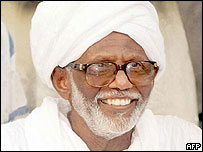 Conventional wisdom can be a stubborn thing. Weekly Standard columnist Thomas Jocelyn fires a shot at it today by telling us what the New York Times failed to regarding Mary McCarthy's 'good fight' against the Clinton attack on al-Shifa--she doesn't now deny the intelligence.
Conventional wisdom can be a stubborn thing. Weekly Standard columnist Thomas Jocelyn fires a shot at it today by telling us what the New York Times failed to regarding Mary McCarthy's 'good fight' against the Clinton attack on al-Shifa--she doesn't now deny the intelligence. For perspective we need to look at Sudan's role in the GWoT. Most people familiar with current events might connect that African country with the genocide in Darfur (but how many realize it's Muslim versus Christian?). As to al-Shifa, nearly everybody thinks it was just an aspirin factory. You can partially thank Rush Limbaugh for that, by the way.
Reviewing briefly, Clinton bombed the chemical plant in Khartoum in the late 90s as retaliation for the Africa Embassy bombings. With the Lewinsky scandal in full bloom there was high speculation that Slick was just wagging the dog. Coincidentally, like Bush using portions of the 2002 NIE to counter allegations from Joe Wilson, Clinton allowed his cabinet to release bits of classified info on Sudan to back up the attack, the most famous being a sort of James Bond-ish tale that traces of a precursor to VX had been found in soil samples snatched outside the plant.
Media sources then began to report the plant was not a poison gas factory but rather made aspirin and antibiotics for third world poor kids. At this point the conventional wisdom began to take root. It was helped along by folks like Limbaugh and other conservatives who wanted to score political points against Clinton.
Interestingly, Clinton supporters still defend this move, as do folks like Clarke, Tenet, and Berger and apparently McCarthy. Ironically, this defense is akin to the Bush supporters who defend the Iraq war using fuzzy intelligence and circumstantial evidence. By the way, do the Clinton supporters realize that by defending al-Shifa they seem to be de facto espousing a Bushian pre-emptive doctrine?
Fast forward to now. The Times covered Ms. McCarthy's initial reservations on the bombing then stopped short, playing up the conventional wisdom aspect (just an aspirin factory) but failing to tell us the rest of the story. Let's let Mr. Jocelyn take it from here:
The Times left out, however, that McCarthy had changed her tune by April 2000. As Daniel Benjamin, a fellow NSC staffer, wrote in 2004:In retrospect it was quite prudent for Clinton to be concerned with Sudan. Hassan al-Turabi, the charasmatic leader of Sudan at the time, was widely rumored to be heading an effort to bring Muslim countries together to stand up to the United States, and part of that involved using resources and expertise from Iraq.
The report of the 9/11 Commission notes that the National Security staff reviewed the intelligence in April 2000 and concluded that the CIA's assessment of its intelligence on bin Laden and al-Shifa had been valid; the memo to Clinton on this was cosigned by Richard Clarke and Mary McCarthy, the NSC senior director for intelligence programs, who opposed the bombing of al-Shifa in 1998. The report also notes that in their testimony before the commission, Al Gore, Sandy Berger, George Tenet, and Richard Clarke all stood by the decision to bomb al-Shifa. [Emphasis Added]
This was not unusual, since practically every story regarding state sponsorship of terrorism lacks a smoking gun but is awash in circumstantial evidence. That's by design of course. The primary evidence against Sudan was their previous harboring of Bin Laden, whom they later expelled. That along with revelations about al-Shifa might have closed the case for the media, but a deeper look seemed to legitimize the Clinton White House's concern:
The relationship began shortly before the first Gulf War. According to reporting in the memo, bin Laden sent "emissaries to Jordan in 1990 to meet with Iraqi government officials." At some unspecified point in 1991, according to a CIA analysis, "Iraq sought Sudan's assistance to establish links to al Qaeda." The outreach went in both directions. According to 1993 CIA reporting cited in the memo, "bin Laden wanted to expand his organization's capabilities through ties with Iraq."Indeed, in their defense of McCarthy the Times was simply promulgating those old conventional wisdoms--that al-Shifa made aspirin and that Saddam was not a threat. Their goal was to put McCarthy's objections in context with critics on the right, which proves she wasn't capable of being partisan.
The primary go-between throughout these early stages was Sudanese strongman Hassan al-Turabi, a leader of the al Qaeda-affiliated National Islamic Front. Numerous sources have confirmed this. One defector reported that "al-Turabi was instrumental in arranging the Iraqi-al Qaeda relationship. The defector said Iraq sought al Qaeda influence through its connections with Afghanistan, to facilitate the transshipment of proscribed weapons and equipment to Iraq. In return, Iraq provided al Qaeda with training and instructors."
But as we've seen, Sudan is a bit more complex than that, and partisan politics are always going to be in play.
DARFUR PROTESTING IS BECOMING AN "IN" THING 4/28/06
And that's not necessarily a bad thing. First it was George Clooney trying to bring light to the subject, now members of Congress. But others have been talking about the problem for years, such as Times columnist Nic Kristof, who won a Pulitzer for his work on the subject, which has included many personal visits to the region.
Maybe the publicity will bring Bin Laden's latest fatwa about Darfur into perspective. This article certainly shines a more strategic light on things:
Southern Darfur, like southern Sudan, is rich in oil. The Chinese National Petroleum Corporation holds the large oil concession in southern Darfur. Chinese soldiers are alleged to be protecting Chinese oil interests.

No comments:
Post a Comment